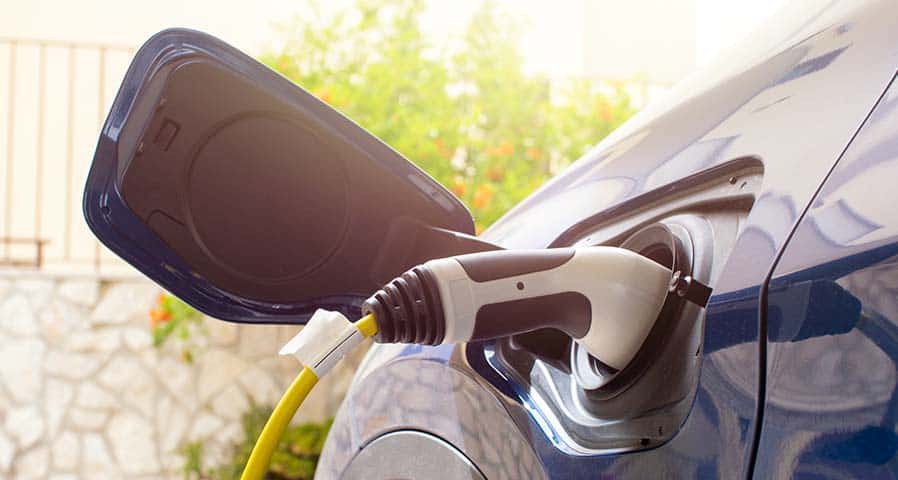DC charging stations get most of the attention. They are large, flashy, and boast a fast charging time. Drivers pull up, pay a charging fee, and are ready to go in minutes instead of hours. Most EV drivers look for a DC charging infrastructure when their batteries are running low.
AC chargers are often overlooked due to their slower charging speeds, but they are the workhorses of EV charging. AC chargers are less expensive for owners and operators. They can install up to ten or even 20 AC chargers for the price of a single DC model. AC chargers are common at places EV drivers usually linger like work, stores, restaurants, hotels, and private residences.
How AC Chargers Work
Your EV battery uses DC power, and the electric grid produces AC power. You don’t have to worry about power conversion times with DC chargers. It’s also why they have a fast charging time.
Using an AC charger requires the vehicle to use its internal rectifier. The component converts AC power to useable DC power.
Factors Affecting Charging Times
A few factors affect AC charging times that includes converting AC into DC power. You can’t speed up the power flow to boost charging times, but some EVs will finish faster than others.
The vehicle’s battery size also determines how long the EV stays plugged into the charger. A smaller battery will charge faster than a larger one.
Charging speeds are affected by more than just AC or DC power, there are several other factors that need to be taken into consideration. In our blog; A Look at EV Charging Speeds, we take a deep dive into the factors surrounding charging speeds and what you need to know before making your AC or DC charger purchase.
How to Choose an AC Charger
Look for an AC charger that meets the needs of EV drivers and your business. If you have walls or other obstacles in the way, choose mounted AC charging infrastructure. You can mount the chargers on pedestals allowing drivers to avoid any obstacles in the area.
The amperage must be compatible with the power grid. Most chargers integrate smoothly, but it’s still a good idea to have a licensed electrician that has experience with EV chargers to take a look at your infrastructure. You also want the AC charger to come with reliable and robust software for seamless operation.
Finally, make sure the charging stations are certified and that they have the desired EV charging plug.
AC Charger Specifications
AC chargers vary according to the manufacturer. Some work with the cloud, while others don’t come with the ability to store data. The amperage also differs on different models.
To give you an idea of what an AC charger’s specs can look like, here’s what you get with the Noodoe EV W1000 AC Charger.
- Output Power: Up to 7.6 kW
- Max Input Current: 32A
- Input Power: 220~240 Vac, 50/60 Hz; 1-phase
- Vehicle Connector: SAE J1772
- Certifications: UL, cUL
This is our powerhouse AC charger. To find out how many chargers you can install, divide the max input current (32) by the available amps. (click here to view and download the full spec sheet)
Understanding UL, CE, and OCPP Certification
Authorized organizations use these certifications to indicate consumer goods that are safe for public sale and consumption.
UL Certification is supplied by the Underwriters Laboratories, founded in the 19th century. The organization handles safety testing for OSHA (Occupational Safety and Health Administration). The certification covers a range of products, processes, and facilities. It is specifically used in the United States.
CE Certification is the European equivalent. The certification is required on all products used and sold within the European Union.
OCPP (Open Charge Point Protocol) is the standard for EV charging infrastructure hard and software. OCPP-compliant charging stations can run on OCPP software. Noodoe EV operating and charging stations are OCPP-compliant giving you reliability and flexibility.
EV Charger Management System
You need a management system to run your smart EV charger. You want a system that offers everything from in-depth charging reports to system recovery in the event of a power failure. Extended features like load-balancing and pre-set charging fees are something else to look for in an AC charger management system.
AC Chargers from Apogee Charging Solutions
There is no denying DC charging stations are fast but don’t discount AC chargers. These slower charging stations have a place in EV infrastructure. They give drivers time to shop, dine, and relax while they’re charging their vehicles.
To speak with an Apogee Charging Solutions expert about AC charging stations, call 484-816-2076, email [email protected], or you can schedule a call that fits your needs by clicking the button below.








0 Comments